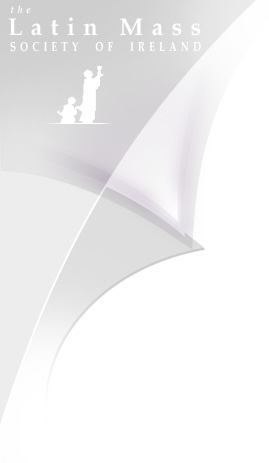
WHAT IS THE TRIDENTINE MASS?What is the Tridentine Mass?
It's the Mass used in the Catholic Church for almost 1500 years, until the introduction of the Mass of Pope Paul VI following the Second Vatican Council. Why is it called the Tridentine Mass? Because it was codified by the Council of Trent in the 16th century. But the Mass itself is far older than that. The Canon, or central part, of the Mass dates back to the time of St Gregory in the sixth century. In 1570, Pope St Pius V - in his Papal Bull Quo Primum - said that priests could use the Tridentine rite forever, "without scruple of conscience or fear of penalty" Wasn't the Tridentine Mass banned? No, but following the Second Vatican Council, its public use was restricted by most Bishops. After the introduction of Pope Paul VI's new Mass, the only priests given permission to say the Tridentine Mass publicly were priests of England and Wales, thanks to an indult (or permission) granted by the Vatican to Cardinal Heenan of Westminster. Other priests - such as St. Padre Pio and Blessed Josemaria Escriva, the founder of Opus Dei - continued to use the old Mass privately in preference to the new rite. What's the advantage of the Tridentine Mass? One of the great strengths of the Tridentine Mass is its uniformity. Wherever Catholics go in the world, the Tridentine Mass is exactly the same. The movements and gestures of the Mass are clearly prescribed, so there's no room for "personalisation" of the liturgy. And the time-honoured Latin of the Mass reverently reflects the sacrificial nature of the celebration. Didn't the Second Vatican Council forbid Latin Masses? Not at all. The Council, in its Constitution on the Sacred Liturgy, said: "The use of the Latin language is to be preserved". The Council merely gave permission for the limited introduction of the vernacular (or local language) into certain parts of the Mass when celebrated in public. Does the Pope approve of the Tridentine Mass? Certainly. In his 1980 letter to the Bishops on the Holy Eucharist, Pope John Paul II said: "There are also those people who, having been educated on the basis of the old liturgy in Latin, experience the lack of this 'one language', which in all the world was an expression of the unity of the Church and which, through its dignified character, elicited a profound sense of the Eucharistic mystery. It is therefore necessary to show, not only understanding, but also full respect towards these sentiments and desires. As far as possible, these sentiments and desires are to be accommodated." So are Catholics entitled to attend a Tridentine Mass if they wish? Yes. In 1988, Pope John Paul II issued his binding instruction Ecclesia Dei Adflicta. The Pope ordered: "Respect must everywhere be shown for the feelings of all those who are attached to the Latin liturgical tradition by a wide and generous application of the directives already issued by the Apostolic See." This instruction grants a privilege to Catholics under Canon Law. Cardinal Mayer, the former head of the Vatican Commission Ecclesia Dei, said the Pope had spoken of the "lawfulness" of the Tridentine Mass and of the "legitimate aspiration" of Catholics to celebrate or attend that Mass. "Hence a privilege in the canonical sense of the term was granted to the faithful by the supreme legislator of the Church," said Cardinal Mayer. "Once a privilege is duly granted, the subject indeed has the right to benefit from it." Where can I attend a Tridentine Mass? The Latin Mass Society of Ireland can provide details of regular Masses throughout Ireland. The Society was set up in 1999 to promote the celebration of the Tridentine Mass throughout Ireland according to the 1962 Missal. What if there's no Mass in my area? You should find out whether there is a genuine desire among Catholics in your area to attend a Tridentine Mass. If so, list the names and addresses of those who wish to attend and ask your local Bishop to grant permission for a Tridentine Mass. A copy of the letter and the names and addresses should also be sent to the Latin Mass Society. If required, the Society will help with the application to the Bishop. Who would celebrate the Mass? Your Bishop will probably appoint a local priest to say the Mass. In cases of difficulty, the Society can organise a priest to celebrate an occasional Mass. The Society can also provide a video, instruction books or personal help for priests and altar servers wishing to learn to use the old rite. What can I do to help promote the Tridentine Mass? The first thing is to pray that God's will be done in the restoration of the old rite. You can also organise Masses in your diocese, support pilgrimages and other initiatives organised by the Latin Mass Society and offer financial or practical help. © Kieron Wood |